2026 International Congress on Medieval Studies: Call for Papers
July 2, 2025 in Announcements, Bāḥra ḥassāb: Knowledge Transmission in Ethiopia and Eritrea From Antiquity to Modern Times, Call for Papers, International Congress on Medieval Studies, Kalamazoo, Koller-Collins Center for English Studies, POMONA, Postal History at Kalamazoo, Princeton Bibliophiles and Book-Collectors, Rossell Hope Robbins Library at the University of Waterloo, Societas Magica
Call for Papers
Sessions Co-Sponsored by the RGME
at the
61st International Congress on Medieval Studies
May 14–16, 2026
(Sessions variously online, in-person, and hybrid)
Proposals due by 15 September 2025
[Posted on 1 July 2025, with updates]
Sounding the Call
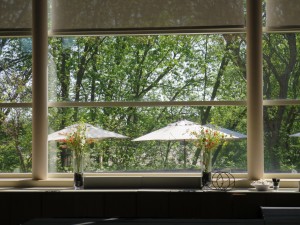
View from Fetzer Lounge at the 2017 Congress. Photography © Mildred Budny.
We announce the Call for Papers for the Sessions (Panels of Papers) co-sponsored by the Research Group on Manuscript Evidence at the 2026 International Congress on Medieval Studies (ICMS). We describe the sessions one by one below, with direct links for you to submit proposals for each of our sessions.
The general Call for Papers appears on the Congress website.
To find our Sessions there, search under Sponsoring Organization
Search for the RGME (or our Co-Sponsor for the given session). In the Sponsors’ list, you will find our sessions as a group:
Please submit your proposals for papers through the Congress Confex system through its Call for Papers, as described there. The deadline is 15 September 2025.
The participation by the RGME at the Annual ICMS over the years is chronicled in our blog.
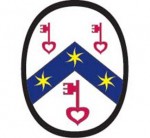
RGME Sessions for the 2026 ICMS
We announce five co-sponsored sessions for 2026.
The co-sponsors for our ICMS Sessions are:
- Societas Magica
- Polytheism-Oriented Medievalists of North America (P.-O.M.o.N.A.)
- Postal History at Kalamazoo
- Rossell Hope Robbins Library and Koller–Collins Center for English Studies at the University of Rochester
- Bāḥra ḥassāb: Knowledge Transmission in Ethiopia and Eritrea from Antiquity to Modern Times at the University of Münster
For our co-sponsorships for the Congress over the years, 2026 marks
Year 22 of our co-sponsorship with the Societas Magica
Year 5 with P.-O.M.o.N.A.
Year 3 with Postal History at Kalamazoo
Year 1 with Rossell Hope Robbins Library and Koller–Collins Center for English Studies at the University of Rochester
Year 1 with Bāḥra ḥassāb at the University of Münster
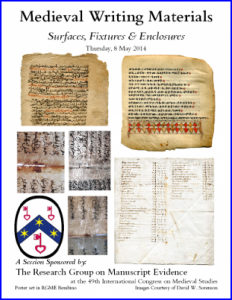
2014 Congress Medieval Writing Materials Poster
The Session co-sponsored with Postal History at Kalamazoo continues the tradition of our long-term series of RGME Sessions at the ICMS on “Medieval Writing Materials”, which began in 2014. See, for example,
- our Congress Activities over the years; and
- 2022 International Congress on Medieval Studies Program.
Sessions Seeking Papers
Click on the link of the Session title here to go directly to its location in the ICMS Call for Papers. From there, following the instructions, you can submit your proposal. Your proposal is due by 15 September 2025.
Make sure to submit your proposal through the ICMS Conference Confex portal. For questions about the individual sessions, please contact the organizers of the sessions or the RGME.
We look forward to your responses.
1. Magic, Manuscripts, and Material Culture
Hybrid Session
Sponsors
- Research Group on Manuscript Evidence
- Rossell Hope Robbins Library and Koller–Collins Center for English Studies at the University of Rochester
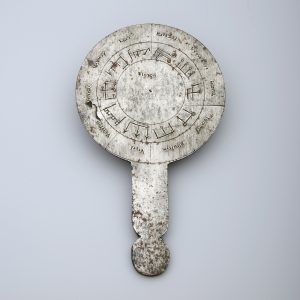
Magic mirror of Floron. Mathematisch-Physikalischer Salon, Staatliche Kunstsammlungen Dresden. Via Creative Commons.
Organizers
Anna Siebach–Larsen (University of Rochester)
Mildred Budny (Research Group on Manuscript Evidence)
Phillip Bernhardt–House (Research Group on Manuscript Evidence)
Derek Shank (Research Group on Manuscript Evidence)
Aim
Papers in this session will investigate the relationship(s) between manuscript descriptions of magical and/or alchemical rituals, implements, and other materials, the illustrations in those manuscripts, and archaeological evidence based on surviving artifacts. We will seek to further our understanding of how tools were used in physical rituals, as well as how practitioners procured, made, stored, used, and cared for the tools of their trade. We will also seek to understand where and how the evidence provided by worded descriptions, illustrations, and material artifacts corresponds with, conflicts with, or serves to mutually enrich the other evidence.
*****
2. Grimoires of the Greater West: Conversations on Solomonic Magic
In-Person Session
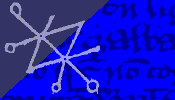
Societas Magica logo
Co-sponsors
- Societas Magica
- Research Group on Manuscript Evidence
Organizers
Gal Sofer (Ben-Gurion University of the Negev)
Matthew Melvin-Koushki (University of South Carolina)
Aim
Solomonic magic is a transhistorical and transcultural phenomenon, with texts attributed to King Solomon appearing in Jewish, Christian, Islamic, and other traditions. While often studied in isolation, their shared vocabularies and interconnected histories remain understudied. This session takes a cross-cultural approach to Solomonic magic, inspired by recent publications like Solomonic Magic: Methodology, Texts, and Histories. We invite contributions that explore new sources or methodologies—from ritual manuals and talismanic compendia to demonological treatises and polemical texts—and encourage interdisciplinary dialogue to better understand the development and reception of these traditions.
*****
3. The Alchemy of Learning: Magic, Pedagogy, and Public Engagement
In-Person Session

Societas Magica logo
Co-sponsors
- Societas Magica
- Research Group on Manuscript Evidence
Organizer
Veronica Menaldi (Independent Scholar)
Aim
In the middle ages astrology and other esoteric topics were part of the university curriculum. How is magic, in its most broad sense, taught or engaged with today and in what ways does it appear in both the classroom and public humanities outreach? Magic is an increasingly attractive topic for both students and the general public. As such, scholars, educators, and librarians/curators have vast opportunities to weave in clever methodologies to teach occult subjects from practical divination to collaborative compendiums. How can teaching magic jumpstart learning, increase engagement or interest, and propose solutions for perennial concerns among the occult-curious?
*****
4. Moving the Mail: Letters, Couriers, and Post Offices in the Medieval World
In-Person Session

Private Collection, Courier delivering letter. German translation of Petrarch (1559).
Co-sponsors
- Postal History at Kalamazoo
- Research Group on Manuscript Evidence
Organizers
David W. Sorenson (Independent Scholar)
Mildred Budny (Research Group on Manuscript Evidence)
Aim
In a world in which long-distance communication was necessarily through the written word, getting it from sender to recipient could be a complicated process. While important correspondence could be sent “post-haste,” ordinary letters were typically much less speedy, and while royal dispatches might go through an efficient royal system, ordinary mail received a very much less efficient, more ad hoc, treatment. This session is intended as a means of examining the means through which mail moved, whether in Europe or elsewhere.
*****
5. Chronology and Divination Beyond the Medieval West
Hybrid Session
Co-Sponsors
- Research Group on Manuscript Evidence
- Bāḥra ḥassāb: Knowledge Transmission in Ethiopia and Eritrea from Antiquity to Modern Times, at the University of Münster
Organizer
Augustine Dickinson (University of Münster)
Aim
While often considered categorically separate, it is typically the case in premodern manuscript cultures that no significant separation is made between chronology, astrology, and divination, with texts, tables, and diagrams related to these often appearing together in manuscripts. This phenomenon has drawn a meaningful amount of attention in research focused on the European and other intertwined manuscript traditions, but it continues to be overlooked with respect to traditions on the “periphery,” such as the Ethiopic, Syriac, Coptic, or Indic traditions. This session would bring together papers focused on these traditions while encouraging cross-disciplinary discussion with scholars working in other fields.

Princeton University Library, Ethiopic Manuscript No. 42, fol. 47v. The Cycle of Kings (Awədä Nägäśət), Collection of Divination Texts. Image via https://dpul.princeton.edu/msstreasures/catalog/nc580r397.
*****
Recap
To recap, your proposal for a paper for a session is due by 15 September 2025.
It must be submitted through the Congress Confex Portal. See
Instructions
Select the Session for which you wish to propose a paper.
To find its location on the Confex Portal, here we offer both
1) a direct link for each session and
2) a guide to navigating through the portal to reach your chosen session.
EITHER:
1) For your chosen session, click on the streamlined link in the Session Title above (RGME Sessions 1, 2, 3, 4, 5) to go directly to its location in the ICMS Call for Papers. From there, you can submit your proposal.
OR:
2) Follow the instructions on the Congress website:
Search for the Session under Sponsoring Organization
Choose the sponsor. There you will find our sessions as a group:
Select the session. Follow the directions to submit your proposal.
Your proposal is due by 15 September 2025. One person is allowed to submit only one proposed paper, although you could serve also as a presider or respondant for some other session. See the Congress instructions about such permissions.
Soon after the close of the Call for Papers, we will select the programs for each session. You will be notified of the decisions.
For questions about the individual sessions, please contact the organizers of the sessions or the RGME itself.
We look forward to your responses.
*****

Wien, Österreichische Nationalbibliothek (ÖNB), Cod. 1224. Cutbercht Gospels. Salzburg circa 790. Portrait of the Evangelist Matthew at work on writing his text. Image via Image Public Domain via http://data.onb.ac.at/dtl/7365239.
Questions? Suggestions?
- Leave your comments or questions below
- Contact Us
- Sign up for our Newsletter and information about our activities.
Send a note to director@manuscriptevidence.org or RGMEevents@gmail.com
Visit our Social Media:
- our FaceBook Page
- our Facebook Group
- our Twitter Feed (@rgme_mss)
- our Bluesky nest @rgmesocial.bluesky.social)
- our LinkedIn Group
Join the Friends of the RGME.
Register for our Events by the RGME Eventbrite Collection.
Attend our next Events if your timetable allows.
Consider making a Donation in Funds or in Kind for our nonprofit educational corporation powered principally by volunteers. Your donations and contributions are welcome, and can go a long way. They may be tax-deductible to the fullest extent provided by the law.
We look forward to hearing from you and welcoming you to our events.
*****
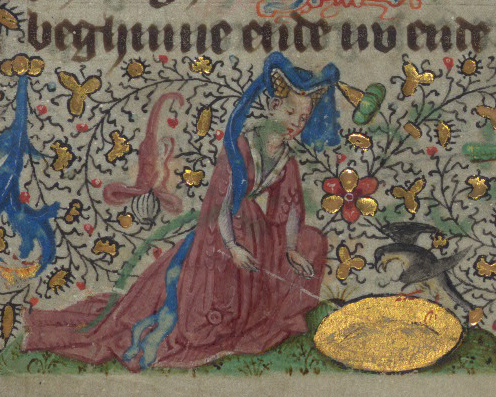
Baltimore, The Walters Art Museum, MS W.782, folio 15r. Van Alphen Hours. Dutch Book of Hours made for a female patron in the mid 15th century. Opening page of the Hours of the Virgin: “Here du salste opdoen mine lippen”. Image via Creative Commons. At the bottom of the bordered page, an elegantly dressed woman sits before a shiny bowl- or mirror-like object, in order, perhaps, to perform skrying or to lure a unicorn.
*****
